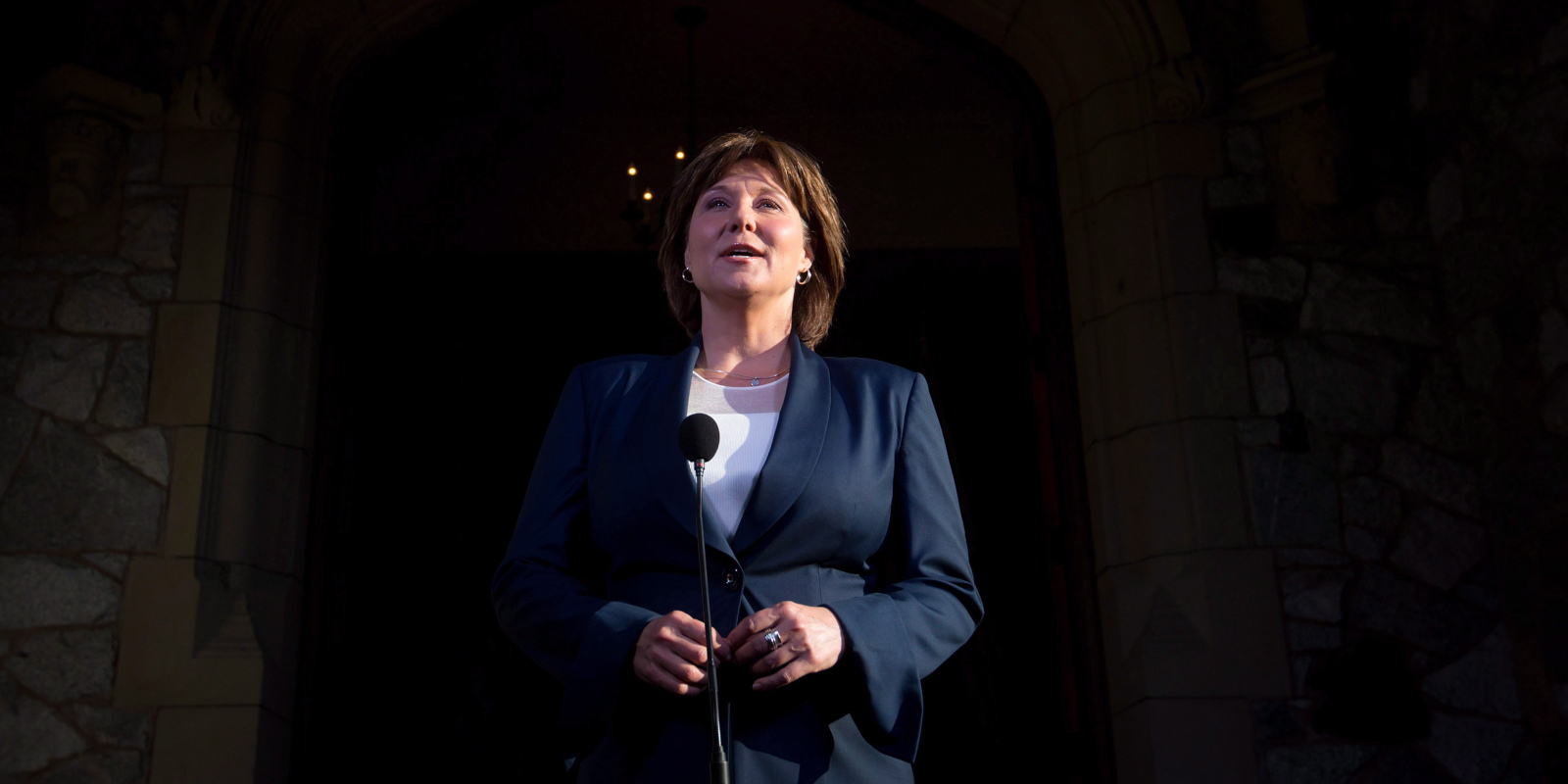Back in 2002, Trent Evans and his crew of icemakers from Edmonton buried a loonie at centre ice at the E Center in West Valley, the arena hosting the hockey games during the Salt Lake City Olympics. Both the men’s and women’s teams went on to win the gold medal in those games and the “lucky loonie” lives on as legend, proudly displayed in the Hockey Hall of Fame in Toronto.
Not much brings Canadians together these days, but hockey (for the most part) remains a unifying force for pride and mythmaking.
It is no surprise, then, that a group hoping to bridge the divide between our polarized population, Centre Ice Conservatives, draws on the metaphor for their name. Centre ice: both the hallowed home of national history and a place where opponents face off. But what else does it represent?
Looking to provide an answer, the newly-formed advocacy group hosted its first conference in Edmonton on Thursday, entitled Let’s Grow, Canada!
Businessman Rick Peterson, a co-founder of the group and the host of the event, positions the group as one that, while non-partisan, is hoping to pull the country’s conservative movement back to the moderate middle. It aims to be a platform for centre-right conservatives, for centrists in general, and for those who feel unrepresented in our politics today. Specifically, for those fed up with the lack of substantive public policy discussions happening in the current Conservative Party leadership race.
Right up front, Peterson answers the question of the group’s intentions: “Are you guys looking to start a party?”
Yes, he says: there will be a cocktail party after the event.
But a new political party? Unequivocally no. “Nobody here wants to do that. That’s just a lot of work.”
Rather, Peterson promises to make the political centre “radical, relevant, and successful.”
What does that look like? Throughout the day, the speakers explored a host of issues common to conservative conversations. A smattering of the themes discussed and conclusions drawn: culture wars, populism, and polarization (bad), serious policy discussions (good), climate change (bad), resource development (good, to a point), energy transition (necessary, but not too fast), nuclear energy (good), infrastructure (critical), Bill C-69 (withdraw it already), our regulatory system (overhaul it), economic growth (necessary), interprovincial trade barriers (a disgrace), military bases in the North and submarines in the Arctic (needed yesterday), the Freedom Convoy (foolishness), open dialogue and compromise on contentious issues (absolutely necessary), debating abortion (absolutely forbidden).
As the keynote speaker, former B.C. premier Christy Clark praised the group as a necessary corrective to a political climate in Canada that is veering too far to the fringes.
“Our leaders are no longer talking about unity, and that is a problem,” said Clark. “Because we are not in fact a united country. I have never seen our country so divided.”
The key to healing this divide, Clark offered, was for our political class to focus less on “slice and dice” electoral considerations and more on unifying messages of compromise. We need to spend more time debating controversial and unconventional ideas instead of denouncing them, and work harder at finding areas of common ground with our foes, she said.
“The most important job for any prime minister is to stand up not for what divides us but what brings us together.”
Calls for compromise and moderation were common throughout the event. And while the ongoing federal Conservative Party leadership race was not an official topic of conversation, when prompted during a Q & A, Clark took the opportunity to again weigh in.
“I think Jean Charest would be a fantastic prime minister,” she said to much applause.
Oblique references to race front-runner Pierre Poilievre and his popular, confrontational style were also sprinkled throughout the day.
The leadership race has too often featured “rage-filled diatribes that accomplish absolutely nothing,” bemoaned Clark.
Without mentioning Poilievre explicitly, commentator Andrew Coyne quipped that “it’s good to be in a room where conservatives are talking about growth and economic policy and not the World Economic Forum.”
He also worried that the Tories are “retreating into unreality and extremism” and are “about to run themselves off of a cliff.”
The party, he said, has become more interested in yelling at others to make themselves feel better rather than offering up substantive policy alternatives.
But what does a “radical” centrist message look like in practice? And how does this substantive policy agenda differ from the Conservative Party’s current platform and direction?
This message was less clear. The most profound reaction of many conference participants seemed to be against the manner, style, and rhetoric of their opponents, rather than ideological differences. If Thursday’s conference is anything to go by and if Centre Ice Conservatives get their way, the future of conservatism will involve fewer enthusiastic rallies and more polite conversations.
Coyne emphasized, however, that valuing moderation in temperament and presentation does not mean watering down one’s ideological commitments.
“I’m not keen on centrism if it means taking half measures on everything.” Rather, he explained, a centrist disposition works if you draw on policies and philosophies from all sides to provide better, more efficient, and more equitable outcomes for all Canadians.
Former MP Leona Alleslev was keen to point out that this approach does not mean getting mired in the “mushy middle”, but is instead focused on making the conservative movement more appealing to the rest of the country.
The energy in the conservative movement seems to be elsewhere, however, as Poilievre remains the presumptive favourite to helm the federal Conservatives, has sold the most memberships, and has garnered the vast majority of support and endorsements from those within the party, including Stephen Harper.
For their part, the organizers of the conference are keen on facilitating more conversations like these in the hopes of drawing on like-minded allies across the country. An upcoming conference in Halifax was announced, with details to come.
But will any of this effort actually translate to political power in our populist era? Despite the group’s strategic association with this country’s national pastime, as anyone who knows hockey understands, it’s hard to actually score a goal from centre ice. All the action is elsewhere.
Recommended for You

Laura David: Red pill, blue pill: Google has made its opening salvo in the AI-news war. What’s Canadian media’s next move?

The Notebook by Theo Argitis: Mark Carney’s first major tests

The Weekly Wrap: Trudeau left Canada in terrible fiscal shape—and now Carney’s on clean-up duty

Ben Woodfinden: Lament for an ‘elbows up’ nation




